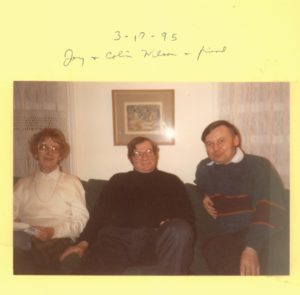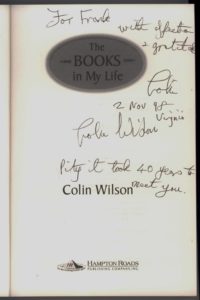As I wait to receive my copies of Rita’s World, Vol. II, I continue reading Gary Lachman’s book about Colin Wilson. How I wish he were still here, able to read it! I know he would, because as someone said of Hemingway, Colin read everything. And if he had read it, he would have given me his candid opinion of it, which might or might not have shed light on the subject, but would very likely have shed light on Colin’s position, and on my own.
Colin, for 25 years before we met, was my literary and – shall we call it developmental? – idol. Then once we finally met in 1995, we recognized each other as kindred spirits. We became friends, and then – strange bounce! – he became one of my authors. (I remember thinking, “I never dreamed that I would ever become Colin Wilson’s editor!”)
In the years before Colin got email, he and I used to exchange letters by transatlantic fax. (Most of his earliest letters have faded to illegibility, to my distress.) We were affectionate friends from first sight, and that never changed. But our correspondence made it clear that intellectually, we touched only in certain places. In some ways we saw the world very differently. Beyond the Robot brings back the differences, and makes me wish all the more that he were still here to see the non-3D world described as Rita described it to me last year.
It would be churlish to begrudge the blessings that were withheld, in light of the blessings that were bestowed. Friendship is always a privilege. This one was a once-in-a-lifetime gift, well remembered.


